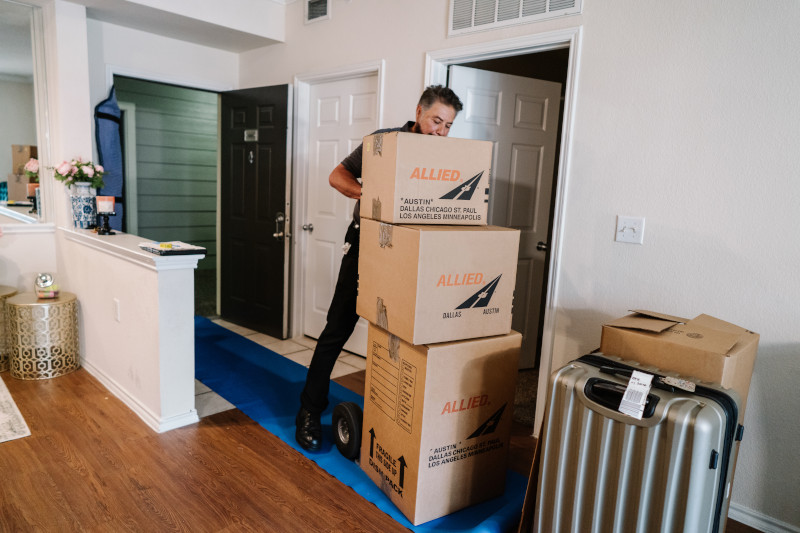Moving is stressful but understanding the scope of your move and how your destination affects the intricacies of it is crucial. To consider why the two would be vastly different, just consider the difference between moving locally within 8 miles and moving long distance such as 800 miles and you can quickly start seeing some of the different challenges.
Long Distance Moving vs. Local Moving Costs
The earliest differentiation you will come across in hiring a long-distance moving company versus a local moving company is the cost. Interstate moves are typically far more expensive then local moving or intrastate moves. You will also typically be dealing with different “operating authority” than you would be on a local or intrastate move. This is because the long-distance moving component of a relocation company is federally regulated by the Federal Motor Carrier Safety Administration as your shipment will cross state lines.
Most local moving companies have their own operating authority within the state in which they are registered. A long-distance moving company will usually have its interstate authority through a van line for whom they act as an agent. The van line typically establishes pricing guidelines and moderates how much tonnage is booked on a certain day to avoid any service failures, as well as establishing the qualification process for the van foreman who will haul long distance interstate household goods shipments.
Currently the cost to load, transport and deliver a long distance, interstate move is typically between $1.50 to $2.00 per pound depending upon the size of the shipment, the load date and the van line that is pricing it. This can also vary based on whether you are moving under a preferred customer agreement or relocation package through your employer. This does not include having the mover pack everything into cartons and the total mileage your shipment travels can impact the cost per pound.
What is the Cost of a Long-Distance Move?
While the cost between a long-distance relocation and a local relocation varies, the estimates will as well. They may use one estimate presentation on local and intrastate moves; but be required to use the van line’s estimation format on interstate moves or long distance moving.
The estimate should lay out all the charges, how the final charges will be calculated and how the charges are to be paid and when. The Federal Motor Carrier Safety Administration (FMCSA) also requires that long distance moving companies clearly delineate the cost of any potential services which you are not requesting but could become necessary due to circumstances unknown to you and the interstate household goods carrier at the time the estimate was produced. (Delivery to self-storage, use of a shuttle van, a request to deliver the goods into carrier provided storage, etc.)
A copy of the survey should accompany the cost of any interstate moving estimate(s) you receive. The survey very specifically declares what items are being including in the pricing agreement. If you have questions about any of the sections of the survey or any of the acronyms used, ask the surveyor. Asking questions prior to the loading process is always preferable to finding out on the moving day that something crucial was missed.
Additionally, the sales person should provide you with the Guide to a Good Move as well as Your Rights and Responsibilities When You Move. The Federal Motor Carrier Safety Administration oversees long distance movers and REQUIRES them to provide this literature alongside any interstate estimate they provide. https://www.fmcsa.dot.gov/protect-your-move/consumer-rights
Inventory of Your Items
Whether you have a packing crew coming to box everything up or whether it is the loading crew, make sure you disconnect and unplug all of your electronics and separate the cords. If you have opted to dismount your own flat screen TVs, make sure they are disconnected and down prior to the crew’s arrival. Have the walkways within your home and to and from the street clear of any boxes or household goods items.

Prior to loading an interstate shipment, a crew member will perform an inventory of the items to be loaded. As the homeowner, you should be available in case they need to confirm items to be loaded or want to review any pre-existing damage they are entering onto the inventory sheet.
During this inventory, the person performing the inventory has the right to see, inspect and re-pack any items you have included on the High Value Inventory. This serves the purpose of confirming they are in the shipment (protects you) and allows the carrier to insure they are packed properly (protects the carrier.)
You can help expedite this process by pulling items out of obscured storage areas, crawlspaces and attics that don’t have fixed stairs. You know your residence and the areas which may be missed by the crew because they are out of plain view. The more items you can put in plain view of the crew, the better the odds that nothing will be missed during the loading process.
All carriers recommend not shipping irreplaceable items. Items such as stamp collections, stock certificates, birth certificates, family photos and heirlooms cannot be replaced.
How to Prepare for Moving Day When Relocating
When you move locally, the truck has the option to make several trips between residences if necessary and you as the customer are able to make several trips between your old and new residence. When you hire a long-distance moving company, it is imperative that EVERYTHING MAKES IT ONTO THE TRUCK ON LOADING DAY.
Locally the delivery date is usually very clearly delineated to be a certain day or days. On a long-distance household goods move you are given a “delivery spread.” Most long-distance moving companies will be able to provide a smaller spread within the larger spread at the time they load the shipment.
You can shorten this delivery spread through exclusive use but it will increase your long distance moving price considerably as you are now paying for space you do not need for your household goods shipment.
A long-distance interstate moving and storage van foreman will typically do a post loading walk through with you to insure nothing was missed. If the driver does not offer to do this you are within your rights to ask them to make one last pass through the house with you, to insure everything was loaded. Just keep in mind once the post-loading walk through is completed, if anything is left in the home the moving company is no longer responsible.
Things change on delivery spreads though. Shipments are removed from a trip, shipments get added to a trip, drivers catch colds like the rest of us or must do a 34 hour re-start, trucks have mechanical issues that need tended to immediately.
You may be at destination already enjoying the great weather you are moving there for. The driver may be sitting out a tornado or hurricane in their path or waiting for Colorado to clear the snow from the interstates through the Rockies. As the consumer you must plan accordingly. You must be able to be available to receive the shipment ANY DAY WITHIN THE OVERALL SPREAD PROVIDED TO YOU BY THE INTERSTATE CARRIER.
Ideally you should make sure that you have all your utilities at the new home up and running by the first day of the delivery window. The crew will need lighting, water to re-fill their water bottles and electricity to keep additional tool batteries charged up.
Most van lines expect their van fore(wo)men and operations personnel to provide the customer with a minimum of 24 hours of notice prior to delivery. If you are getting less notice than this, it is most likely a result of very unforeseen circumstances out of your and the carrier’s control.
What if Something Changes During the Moving Process?
During the process communication with your relocation consultant is key. If you told them you would pack everything but now realize you have bitten off more than you can chew, call them as soon as you have this realization.

If you said you would service your own grandfather clock and gym equipment…but haven’t, call your relocation consultant. The sooner the better because third party services book well in advance just like long distance moving companies do.
You thought you had your closing date all locked up and are now realizing it may fall through or be pushed back several weeks? Call your relocation consultant so they can give you storage options, price quotes and get a receiving agent set up.
Did you tell the relocation consultant the grand piano was staying behind for your niece? If that has changed and it’s being shipped call your relocation consultant immediately as they may now require one helper more than they had planned.
Collaboration is key. You could have the best crew in the world but if they come in behind poor or a lack of collaboration their job has just become immensely harder and they are starting the process disadvantaged.
How do you pay when hiring a professional moving company?
Paying for a long-distance household goods relocation varies from paying for local moves. YOU CANNOT PAY WITH A PERSONAL CHECK. You must pay prior to any of your goods being delivered. Most long- distance interstate moving companies accept certified checks, cashier’s checks, cash or debit/credit cards.
Consider time zones when contemplating payment. If the booking agent that scheduled your move for you is in California and your driver is delivering to you in New York at 8 am, there will be no one available to process a credit card for you. In this instance it would be best to pay the charges the evening before to assure that the driver has been advised that he or she can deliver the shipment.
If you are paying by a certified funds, be sure to have it in hand by the first day of the delivery spread. This insures if there are any changes to the delivery date you are ready to pay and receive your household goods shipment.
If you intend to pay with a large amount of cash, let your driver know that in advance. He or she is going to want to plan a stop in their trip to convert the cash to a paper format so they don’t have to carry it with them the rest of their trip and they will probably want to mail the check back to their agent.
The key component to successfully hiring a long-distance moving company is to plan ahead. Vet the companies you are receiving estimates from and do your homework by reviewing sites such as the Federal Motor Carrier Administration and American Trucking Association’s Movers Conference.
Then make a timeline of what you need to have completed and when it must be completed by. Stick to it and make sure you meet your deadlines in order to help alleviate stressful situations before they can happen.